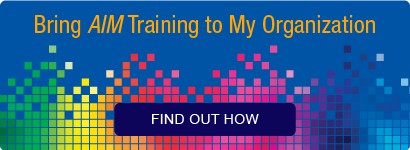Today’s marketplace is filled with Change Management training programs that seem very tempting as an easy solution to all of your training needs. But, buyer beware! All training options are not created equally. And a “sheep dipping” approach of training everyone as a required one-time event just doesn’t work. ![]()
Based on our 25+ years of experience with real life Change Management implementations, we recommend asking yourself, and your potential vendors the following 7 questions before purchasing any training program (no matter how pretty the marketing brochures are):
- Who is leading the training? Best in class Change Management training should always be led by someone who has actual on the ground experience implementing change. It is the years of experience in dealing with Sponsor issues, project teams, setting up Change Agent networks, etc. that make the facilitator an expert and add richness to the session. Without it, the training is only conceptual.
- What’s more important for your audience? The theoretical journey of individual change, or the ability to implement your projects more successfully on the human side, with a practical, business approach? We’ve seen lots of failed Change Management training that doesn’t speak to what is really important to managers and higher-level leaders. The programs are academic, theoretical, and not business-focused. See item 3.
- Is the training "operationally" focused? Change Management training should provide a repeatable process that enables changes to be implemented more quickly and to full value realization. A combination of operational strategies, tactics, and tools wrapped around core principles needs to be used. In simpler words, the focus of the session needs to be on getting things done faster and more successfully!

- Will you be working on your own project or strategy in the training? Training is much more meaningful and useful when you apply what you are learning to your own project, rather than to case studies or simulations that may or may not match your own situation. You are at a real advantage when you leave training with at least a start on actual project deliverables.
- Is there the option for on-going mentoring and coaching after the session? No matter how good a class is the truth of the matter is you can't learn enough in a classroom setting in just a few days to deal with all the complexities you may face on your own program or project. Having access to additional resources and/or coaching is invaluable.
- Are you totally dependent on an outside resource, or can you (with the right level of training and intellectual property licensing) lead the training yourself? It’s ideal to have the flexibility to use an outside expert when you need to, but in most organizations, you want the option to lead some of the training yourself.
- Do you have options that are segmented to the needs of a variety of audiences and situations that can be used to build change readiness? While we are a bit biased, we do believe IMA’s proprietary Accelerating Implementation Methodology (AIM) Change Management training offerings are the best in class.
Below we’ve put together a sample training plan that simultaneously builds readiness for a specific change while also building more long-term change capability. This plan is based around our CAST of Characters and the differing roles they play during a change:
Who: Senior Executives
What: Executive Briefing
This 4-hour session is designed to give Senior Executives an awareness of how they control the pace of change in the organization and what they must do differently, based on actual data of past implementation history. Given these Executives' role as “Authorizing Sponsors” of major initiatives, it's extremely important for them to understand how their own individual and collective actions impact the success or failure of projects. Specifically, the session focuses on what Senior Execs need to do to express, model and reinforce their commitment to the current change portfolio.
Who: Directors and Upper Level Managers
What: SponsorShop
Change Agents know the highest level of resistance will most likely be from mid-Managers and above, so training this audience is crucial. This 1-day session concentrates on the behaviors required from the "Reinforcing Sponsors" of your change initiative. Using the Sponsor Assessment tool, participants create specific, time-bound action plans that focus on how they can be a more effective change Sponsor on actual projects they are accountable for.
Who: Change Agents
What: Introduction to AIM
Change Agents in this 2-day session become familiar with the vocabulary and principles of the methodology, with an emphasis on the definition of the change, Sponsorship, Readiness, Communication, and Reinforcement. Participants will also receive a detailed assessment of their organization's Implementation History in order to pinpoint inhibitors and identify leverage points to accelerate implementation of actual projects they are assigned to.
Who: Change Agents and Managers
What: Accreditation for Internal Super-Users
Your Change Agents won’t have all the skills needed after just 2 days of awareness-building. If you want to build internal change capability, you will need a core group of internal experts you can rely on who can consult to project teams. The 4-day Accreditation is a working session that builds this level of internal capability so that you are not dependent on others for project implementation.
Who: Intact Project Teams
What: Project Planning Workshop
This 3-day workshop is a hands-on session designed to build Change Management methodology awareness in the team that is then applied real-time to the project. Participants learn the proven ten-step process that's covered in the Introduction to AIM program, plus how to use AIM assessment and planning tools to accelerate their own specific project implementation.
Who: Targets of the Change
What: ChangePro
ChangePro is a half-day program designed to create employee readiness. The focus of the session is to provide employees with a tool box to deal with the stress of organizational change proactively and productively.
Whatever training option you select for your organization, whether it is IMA’s AIM training or another organization’s package, go in with your eyes open in terms of expectations and criteria for success. Select your training based on the outcomes you are looking for.



